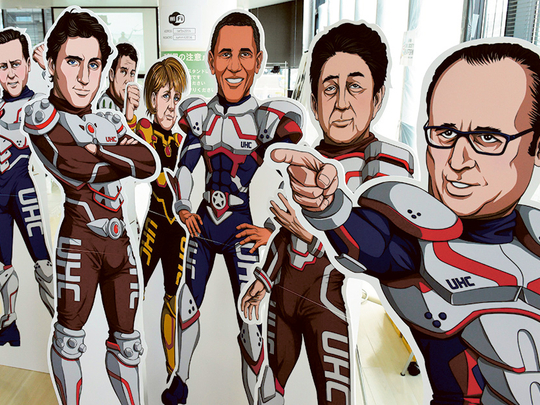
Beijing: Group of Seven leaders agreed to work together to tackle oversupply in the Chinese economy, but didn’t go as far as calling out the country by name for steel dumping.
Speaking at the Ise-Shima summit in central Japan on Thursday, Japanese Deputy Chief Cabinet Secretary Hiroshige Seko said leaders pledged in their first session to deal with oversupply issues, and specifically discussed steel.
“There was various analysis and exchange of opinions about China’s situation,” Seko said. “This relates to a country that was not present, so I cannot give details,” he said. “But there was discussion about over-production and about its status as a market economy.”
Seko’s comments come after European leaders sounded warnings about China’s economy and its perceived oversupply of steel.
UK Prime Minister David Cameron told reporters on Wednesday en route to the summit that Europe’s anti-dumping actions against Chinese steel have been effective. European Commission President Jean-Claude Juncker, meanwhile, told reporters in Japan on Thursday that Chinese steel overcapacity is a “general problem” and Europe can’t afford to be “defenseless” against distorted markets.
“This is affecting all our countries – we have 22 steel-producing countries in the European Union and all the countries having steel industries on their territories have the right to defend their industry,” said Juncker, the former prime minister of Luxembourg.
Trade tensions
Facing its slowest economic growth in decades, China is expanding its overseas sales of its cheaper metal. Its actions have raised trade tensions, generating criticism from some countries amid the global glut. Members of the European Parliament passed a resolution earlier this month opposing granting market economy status to China.
The EU has launched an anti-subsidy review of Chinese steel, while India has imposed import barriers on the metal. US Treasury Secretary Jacob J. Lew calledon China ahead of the summit to cut excess industrial capacity for key metals.
China’s position
On Thursday, China’s commerce ministry said that US determination to conduct an anti-dumping investigation into corrosion-resistant steel imports was a “discriminatory practice.” Anti-dumping rates on Chinese imports are much higher than imports from other regions, the ministry said in a statement.
Chinese Foreign Minister Wang Yi told reporters in Beijing on Thursday that China expected G-7 members to refrain from applying double standards. “We don’t want to see any discussions or actions that might escalate the tension in the region,” he said.
President Xi Jinping has championed so-called supply side reforms, with the closure of surplus industrial capacity and a reduction in leverage in his increasingly indebted country. Yet China’s overseas sales of steel in the first four months were already 7.6 per cent higher than a year earlier, piling on the pressure after the nation shipped a record 112 million tonnes in 2015.
‘Protectionist effort’
Beijing has pushed back against the criticism. The official China Daily newspaper has called the recent EU vote a “protectionist effort” to avoid industrial competition. China’s foreign ministry has described steel overcapacity as a global issue and said it makes no sense to put all the blame on China for EU industry malaise.
“There is a saying in China: the illness may be acute, but don’t be reckless in seeking treatment. Otherwise, the illness will not be cured, and time and efforts will be wasted for no good reason,” Foreign Ministry spokesman Lu Kang said in a briefing on May 10.
Official data suggested China cut 90 million tonnes of steel capacity over the past five years, almost doubling its original goal of 48 million tonnes. The EU imported 32 million tonnes of steel in 2015, and one fifth of that came from China.
Still, domestic companies are looking for opportunities beyond China’s boarders.
“China’s domestic steel output has peaked and there’s no doubt it will continue to fall,” Chen Derong, general manager of Shanghai Baosteel Group Corp., one of the largest Chinese steel makers, said in a presentation in Beijing earlier this month. “We’ve arrived at a time when Chinese steel producers should go abroad and have a global perspective.”
Ahead of the G-7 summit, JFE Holdings Inc. Chief Executive Eiji Hayashida warned last week it wouldn’t be effective to discuss the steel glut in the absence of China. He urged China and other nations to hold talks on the issue, similar to how Japan and the US overcame tensions over textiles, steel and cars decades ago.
“China should be included in discussions, rather than just being criticized,” Hayashida told reporters in Tokyo. “Arousing China’s resentment could just end up with slowing its speed of cuts.”











